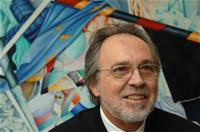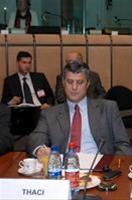Hashim Thaci - a leader of Kosovo or a boss of organised crime
Evelyna Topalova, December 20, 2010
 Swiss senator Dick Marty, who caused public uproar with his revelations about secret CIA prisons in Europe, has again drawn media attention and sparked anger among politicians. Serbs, who were claiming for years of being subject of selective justice by the international community and were accusing Kosovo Albanians of crimes, now received an unexpected support.
Swiss senator Dick Marty, who caused public uproar with his revelations about secret CIA prisons in Europe, has again drawn media attention and sparked anger among politicians. Serbs, who were claiming for years of being subject of selective justice by the international community and were accusing Kosovo Albanians of crimes, now received an unexpected support.
As Council of Europe's Special Rapporteur Marty conducted a two-year investigation into allegations of organised crime in Kosovo. The revelations in his report are quite shocking. They shed unexpected light on Kosovo Liberation Army (KLA) which fought against Serb security forces for the independence of the Serbian province. One of its leaders and incumbent Prime Minister Hashim Thaci, on the other hand, is named as the head of a "mafia-like" group involved in smuggling human organs, weapons and drugs.
The investigation was launched following the publication of the memoirs of former Chief Prosecutor of the International Criminal Tribunal for Former Yugoslavia, Carla del Ponte, suggesting that serious crimes have been committed in Kosovo during the 1998-1999 conflict, including human organs trafficking.
Allegations of organs trafficking is the starting point for the Swiss politician but he goes deeply into the organised crime network in the newest country in Europe. He says that among his sources are combatants of various armed factions that participated in the hostilities in Kosovo; direct victims of violent crimes committed in Kosovo; family members of missing persons; current and former representatives of international justice institutions with jurisdiction over the events in Kosovo.
In the report Marty claims that Serbs were abducted and held prisoners in secret detention centres under KLA's control in northern Albania. In these centres they were treated in an inhuman way and were getting operated forcibly to remove one or more of their organs for the purposes of organ-trafficking for transplantation. People just disappeared shortly after that. These illegal activities were carried out even after the end of the Kosovo conflict which has been confirmed by the 2008 investigation of EULEX into private MEDICUS clinic in Pristina.
The investigator accuses international authorities of failing to conduct a probe despite some concrete evidence that such trafficking existed. He also blames Albanian authorities for their unwillingness to cooperate in the investigation.
In the report Marty highlights that about 1,900 people, about two-thirds of whom Kosovo Albanians, who are still missing from the conflict. Another 470 people (95 Kosovo Albanians and 375 non-Albanians) disappeared after the arrival of KFOR troops in June 1999.
Dick Marty sparked anger among Kosovo politicians because of the way he was depicting KLA. He says that KLA rises from a marginal insurgency to the vanguard of the Kosovo Albanians' struggle for independence in the second half of 1998 through explicit endorsements from Western powers. Thus, the wealthiest donors in the Albanian Diaspora start to channel significant funds to the KLA. The KLA however is not a unified movement but is rather composed of different factions. One of the most  influent one - the Drenica Group - starts dominating and wrests control over most of the illicit criminal enterprises in which Kosovo Albanians were involved in Albania as of 1998. This faction was headed by Hashim Thaci himself.
influent one - the Drenica Group - starts dominating and wrests control over most of the illicit criminal enterprises in which Kosovo Albanians were involved in Albania as of 1998. This faction was headed by Hashim Thaci himself.
Marty writes that confidential reports by agencies dedicated to combating drug smuggling in at least five countries have named Hashim Thaci and other members of his Drenica Group as having exerted control over the trade in heroin and other narcotics. Among the names mentioned in the report are Xhavit Haliti, Kadri Veseli, Azem Syla, and Fatmir Limaj (minister of telecommunications) who are being investigated for war crimes or organised crime.
Thaci and other Drenica Group members are named as "key players" in intelligence reports on Kosovo's mafia-like structures of organised crime, according to the report.
These people were not prosecuted or jailed for two reasons, according to the Swiss senator. The first is that they have managed to make potential witnesses silent by using blackmail, death threats and violence. The second is the lack of sufficient will on part of the international community to prosecute the former KLA leaders.
The special rapporteur of the Council of Europe does not challenge the fact that Serbian forces have committed crimes in Kosovo. His position is that truth is more complex than the simple supposition that Serbs are the aggressors while Kosovo Albanians are the victims. Crimes have been committed by both sides.
Marty's allegations are serious as they target a legitimate leader of a country. They also lash out against the international community which, in the name of short-term stability, has chosen to turn a blind eye to KLA's war crimes.
The timing of this report's release is interesting. It comes after the parliamentary elections in Kosovo, won by Thaci's party. Pristina suspected that Marty is serving Serbia's interests.
The Committee on Legal Affairs of the Parliamentary Assembly of the Council of Europe discussed Marty's report on December 16th and adopted a draft resolution saying that perpetrators of crimes and those having violated human rights should be prosecuted. The document highlights that Marty's probe is not a criminal investigation but aims to encourage relevant authorities to launch such an investigation. The draft resolution calls on Serbia, Kosovo and Albania to cooperate fully with the EU Rule of Law Mission in Kosovo EULEX in order to shed light on crimes related to the Kosovo conflict. The Parliamentary Assembly is to debate on the report on 25 January.
 Bakir Izetbegovic, Andrej Plenkovic | © Council of the EU
Bakir Izetbegovic, Andrej Plenkovic | © Council of the EU Aleksandar Vucic, Recep Tayyip Erdogan | © Serbian Presidency
Aleksandar Vucic, Recep Tayyip Erdogan | © Serbian Presidency Jean-Claude Juncker, Zoran Zaev | © European Commission
Jean-Claude Juncker, Zoran Zaev | © European Commission